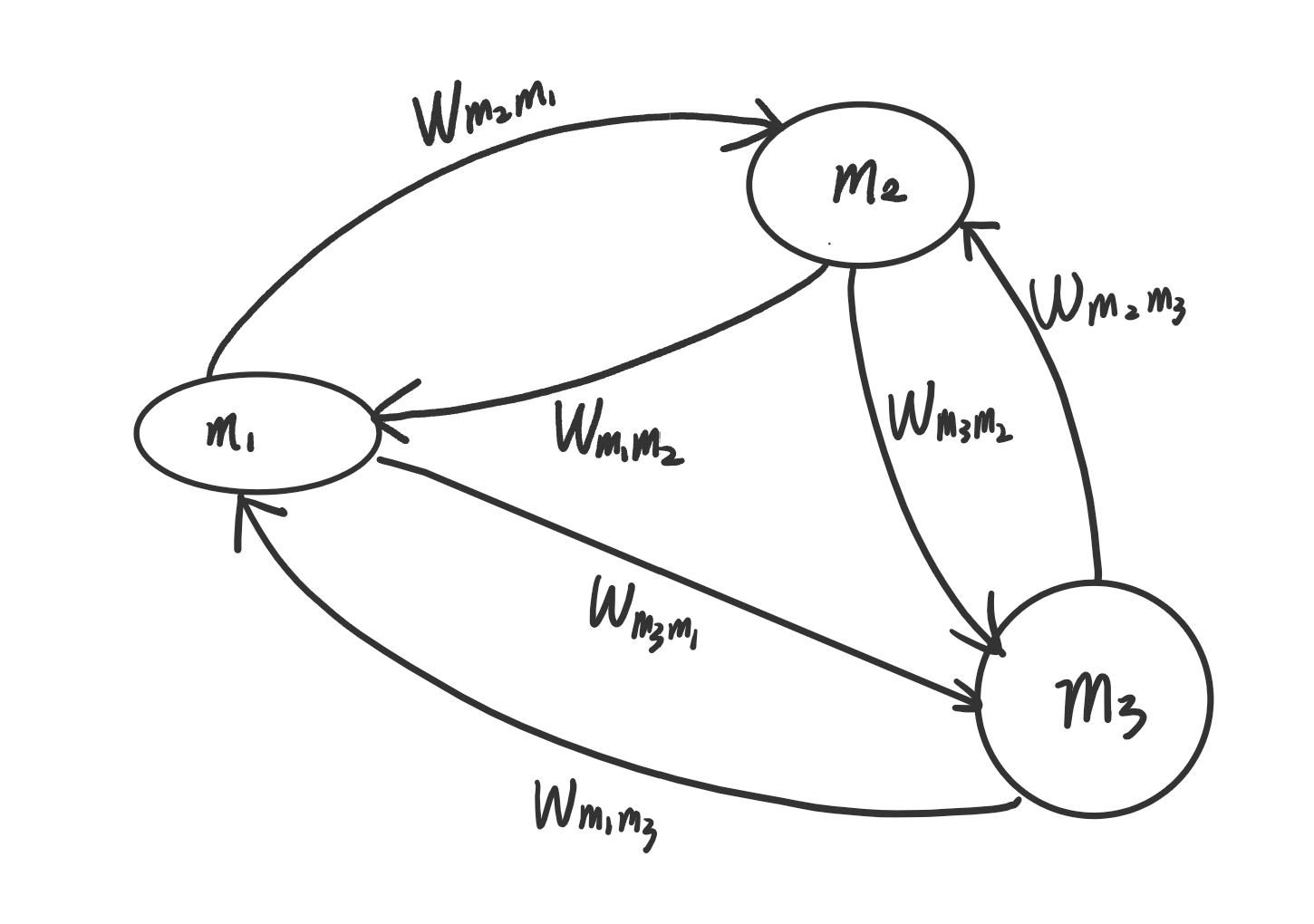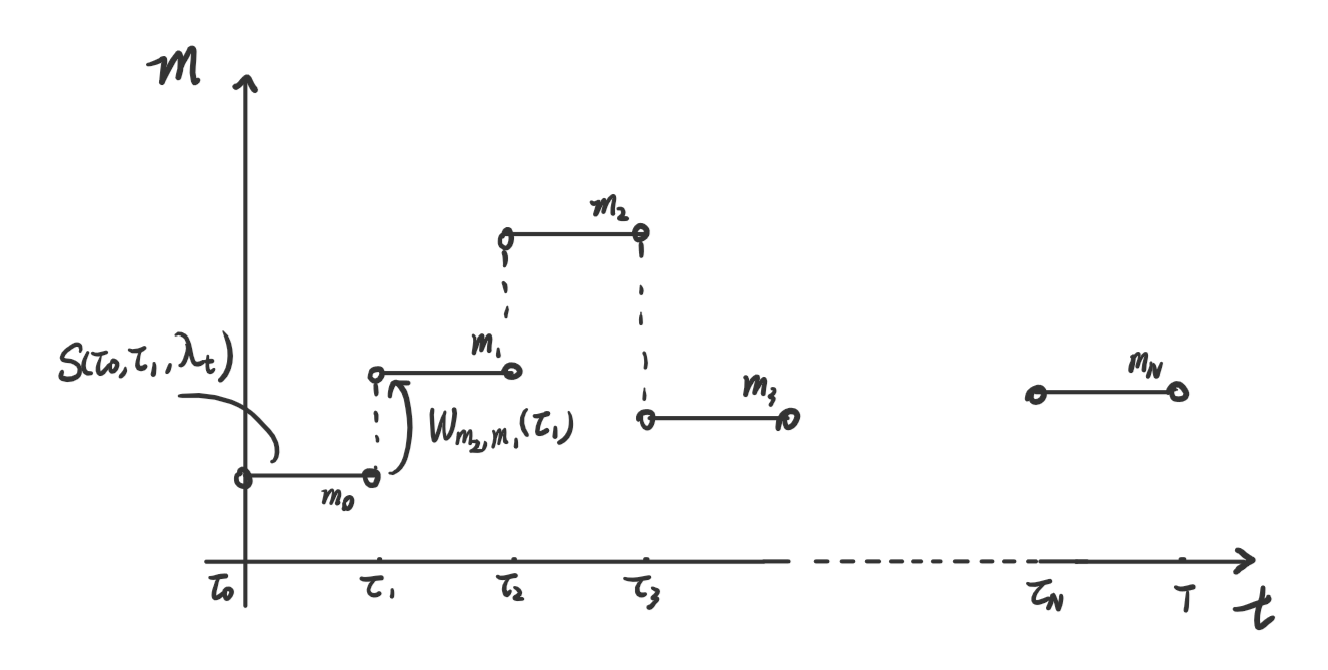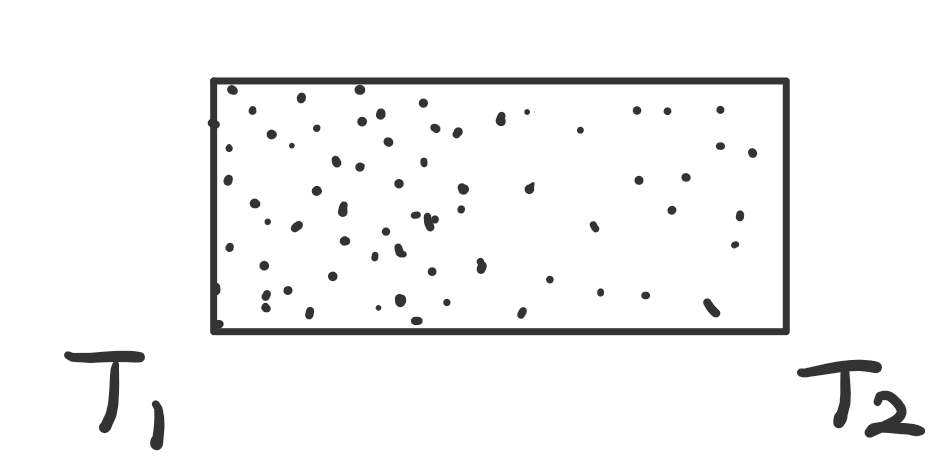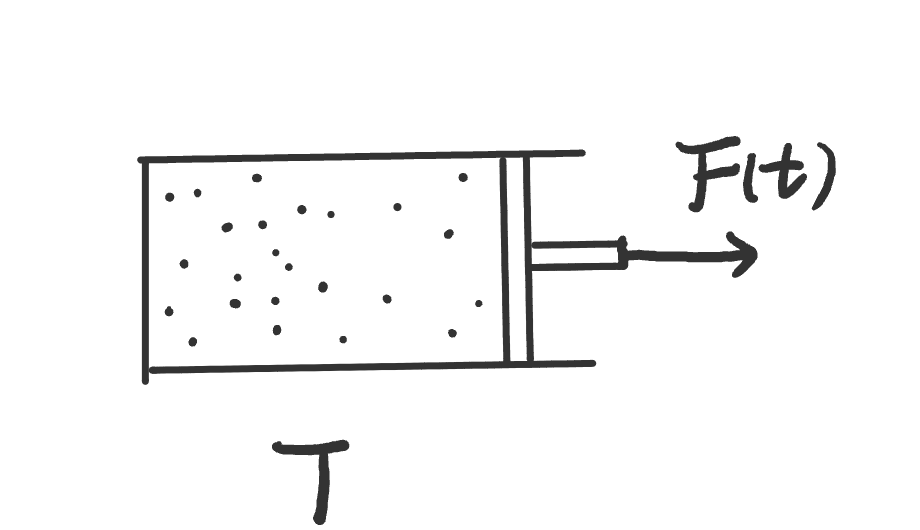class: centre, middle ## Three detailed fluctuation theorems$\ ^{[1]}$ #### *Shiling Liang* *Section of Physics, EPFL* --- ### Recap the fluctuation theorems **Crooks fluctuation theorems** $$ \frac{P(W)}{\bar{P}(-W)}=\exp\left[\beta(W-\Delta F)\right] $$ **Jarzynski equality** $$ \langle \exp(-\beta W)\rangle =\exp(-\beta \Delta F) $$ > **constraints:** From one canonical equilibrium state to another equilibrium state with weak system-reservoir coupling. **The most general form** $$ \frac{P(\Delta S\_{tot})}{\bar{P}(-\Delta S\_{tot})}=\exp(\Delta S\_{tot}) $$ > Two choices of separation of entropy > - system + reservoir: $S\_{tot}=S\_{s}+S\_{r}$ > - adiabatic + non-adiabatic: $S\_{tot}=S\_{a}+S\_{na}$ $\Rightarrow$ satisfy FT individually --- ### Detailed and integral fluctuation theorems For a random variable $R$, it satisfies **integral fluctuation theorem** if $$ \langle e^R\rangle=1 $$ and the **detailed fluctuation theorem** $$ \exists \bar{P}\quad \frac{P(R)}{\bar{P}(-R)}=e^{R}\quad\forall R $$ --- ### Relative entropy/Kullback-Leibler distance Kullback-Leibler distance characterize the difference between two probability distribution of (a) random variable(s) $\mathbf{m}$ $$ \mathcal{D}(P||\mathcal{\tilde{P}})=\sum\_mP\_\mathbf{m}\underbrace{\ln\frac{P\_\mathbf{m}}{\tilde{P}\_\mathbf{m}}}\_{\equiv r\_\mathbf{m}} $$ One can verify that the random variable $r\_\mathbf{m}$ satisfies fluctuation theorem $$ P(R)=\sum\_m\delta(R-r\_m)P\_m $$ and $$ \int dR\ P(R)e^{-R}=1 $$ --- ### To physical systems **Master equation (Markov process)** $$ \dot{p}\_m(t)=\sum\_{m'}W\_{m.m'}(\lambda\_t)p\_{m'}(t) $$ || |:---:| |**Fig.** An example of a Markov process with three states.| --- **Probability of trajectories** Now suppose we have a trajectory of random variables, $\mathbf{m}=\{m\_t,t\in [0,T]\}$, and discretized the time into $N$ steps  $$ \begin{equation} \begin{aligned} P\_\mathbf{m} &=\prod\_{j=0}^Np\_{m\_j}(\tau\_j,\tau\_{j+1})\\\\ &=p\_{m\_0}(0)\left[\prod\_{j=1}^N S\_{m\_{j-1}}(\tau\_{j-1},\tau\_j,\lambda\_\tau)W\_{m\_j,m\_{j-1}}(\tau\_j)\right]S\_{m\_N}(\tau\_{N},T,\lambda\_\tau)\\\\ \end{aligned} \end{equation} $$ --- || |:---:| where $S\_{m\_{j-1}}(\tau\_{j-1},\tau\_j)$ is the survival probability $$ S\_{m\_{j-1}}(\tau\_{j-1},\tau\_j,\lambda\_\tau)=\exp\left[\int\_{\tau\_{j-1}}^{\tau\_j}d\tau'\ W\_{m\_{j-1},m\_{j-1}}(\lambda\_{\tau'})\right] $$ we can also write down the probability of the **reversed process** $ \bar{\lambda}\_t=\lambda\_{T-t},\ \bar{m}\_j=m\_{N-j} $ $$ \begin{aligned} \bar{P}\_{\bar{m}} &=\prod\_{j=0}^Np\_{\bar{m}\_{j}}(\tau\_{j},\tau\_{j+1})\\\\ &=p\_{m\_N}(T)\left[\prod\_{j=1}^N S\_{m\_j,m\_j}(\tau\_{j+1},\tau\_j,\bar{\lambda}\_{T-\tau})W\_{m\_{j-1},m\_j}\right]S\_{m\_0}(\tau,0,\bar{\lambda}\_{T-\tau}) \end{aligned} $$ --- ### Total entropy production $$ \Delta S\_{tot}[\mathbf{m}]\equiv \ln\frac{P\_{\mathbf{m}}}{\bar{P}\_\mathbf{\bar{m}}} $$ #### **system+reservoir picture** $$ \Delta S\_{tot}[\mathbf{m}]=\underbrace{\ln\frac{p\_{m\_0}(0)}{p\_{m\_N}(T)}}\_{\text{system entropy}}+\underbrace{\sum\_{j=1}^N\ln\frac{W\_{m\_j,m\_{j-1}}(\lambda\_{\tau\_j})}{W\_{m\_{j-1},m\_j}(\lambda\_{\tau\_j})}}\_{\text{reservoir entropy}} $$ #### **adiabatic+non-adiabatic picture** $$ \Delta S\_{tot}[\mathbf{m}]=\underbrace{\ln\frac{p\_{m\_0}(0)}{p\_{m\_N}(T)}+\sum\_{j=1}^N\ln\frac{p\_{m\_j}^{st}(\lambda\_{\tau\_j})}{p\_{m\_{j-1}}^{st}(\lambda\_{\tau\_j})}}\_{\text{non-adiabatic }\Delta S\_{na}[\mathbf{m}]} +\underbrace{\sum\_{j=1}^N\ln\frac{W\_{m\_j,m\_{j-1}}(\lambda\_{\tau\_j})p\_{m\_{j-1}}^{st}(\lambda\_{\tau\_j})}{W\_{m\_{j-1},m\_{j}}(\lambda\_{\tau\_j})p\_{m\_{j}}^{st}(\lambda\_{\tau\_j})}}\_{\text{adiabatic }\Delta S\_{a}[\mathbf{m}]} $$ where $p\_m^{st}(\lambda\_t)$ is the steady state distribution, $ \sum\_{m'}W\_{m,m'}(\lambda\_t)p\_m^{st}(\lambda\_t)=0. $ --- ### Physical interpretations $$ \Delta S\_{tot}[\mathbf{m}]=\underbrace{\ln\frac{p\_{m\_0}(0)}{p\_{m\_N}(T)}+\sum\_{j=1}^N\ln\frac{p\_{m\_j}^{st}(\lambda\_{\tau\_j})}{p\_{m\_{j-1}}^{st}(\lambda\_{\tau\_j})}}\_{\text{non-adiabatic }\Delta S\_{na}[\mathbf{m}]} +\underbrace{\sum\_{j=1}^N\ln\frac{W\_{m\_j,m\_{j-1}}(\lambda\_{\tau\_j})p\_{m\_{j-1}}^{st}(\lambda\_{\tau\_j})}{W\_{m\_{j-1},m\_{j}}(\lambda\_{\tau\_j})p\_{m\_{j}}^{st}(\lambda\_{\tau\_j})}}\_{\text{adiabatic }\Delta S\_{a}[\mathbf{m}]} $$ If the system's stationary state satisfies detailed balance condition $$ \frac{W\_{m,m'}(\lambda\_t)}{W\_{m',m}(\lambda\_t)}=\frac{p\_m^{st}(\lambda\_t)}{p\_{m'}^{st}(\lambda\_t)}\quad\forall m,m' $$ the adiabatic contribution is zero $$ \Delta S\_{a}[\mathbf{m}]=0\Rightarrow \Delta S\_{tot}[\mathbf{m}]=\Delta S\_{na}[\mathbf{m}] $$ If the relaxation process is much faster than the time scale of the schedule $\lambda\_t$, i.e. quasi-static process $$ \langle\Delta S\_{na}[\mathbf{m}]\rangle=0 \Rightarrow \Delta S\_{tot}[\mathbf{m}]=\Delta S\_{a}[\mathbf{m}] $$ --- ### Examples || |:---:| |**Fig.** Non-equilibrium steady state, $\Delta S\_{a}\neq 0$| ||| |:---:| |**Fig.** The external force varies faster than the relaxation of the system, $\langle\Delta S\_{na}\rangle\neq 0$| --- ### Three fluctuation theorems By introducing the adjoint transition matrix $\mathbf{W}^+$ $$ W\_{m,m'}^+=\frac{W\_{m',m}(\lambda\_t)p\_m^{st}(\lambda\_t)}{p\_{m'}^{st}(\lambda\_t)} $$ one can obtain the following relation $$ \Delta S\_{na}[\mathbf{m}]\equiv\ln\frac{P\_\mathbf{m}}{\bar{P}\_{\mathbf{\bar{m}}}^+},\quad \Delta S\_a[\mathbf{m}]\equiv\frac{P\_{\mathcal{m}}}{P\_{\mathbf{m}}^+} $$ Using the mathematical relation we introduced before, one can obtain three detailed fluctuation theorems $$ \frac{P(\Delta S\_{tot})}{\bar{P}(-\Delta S\_{tot})}=e^{\Delta S\_{tot}} $$ $$ \frac{P(\Delta S\_{na})}{\bar{P}^+(-\Delta S\_{na})}=e^{\Delta S\_{na}},\quad \frac{P(\Delta S\_{a})}{P^+(-\Delta S\_{a})}=e^{\Delta S\_{a}} $$ --- ### Reference [1] Esposito, M. and Van den Broeck, C., 2010. Three detailed fluctuation theorems. Physical review letters, 104(9), p.090601. --- .center[#Thanks]